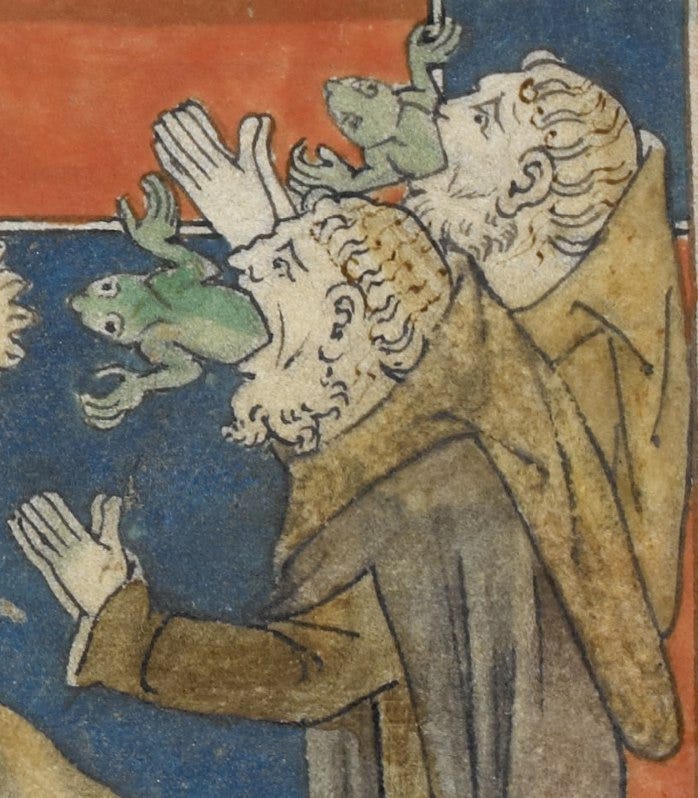Should We Read Mein Kampf If We Really Really Want To?
thoughts about morality of content consumption
Hello,
A lot of people I talk to are going through the same moral conundrum. And it is not an easy one or a new one, either. Essentially, it boils down to a question: should I continue to appreciate art I like if the artist has become a Nazi (or has revealed themselves to be similarly morally repugnant)? After all, in the last two and a half years, the level of visible moral repugnancy in my little slice of the world has grown immeasurably, and it doesn’t show any signs of slowing down.
(A small caveat: I will be fairly often breaking Godwin’s law here, but it should be clear that “Nazi” in some instances in this text is a synecdoche, a colloquial term, and not necessarily literal. In other instances, it is, though.)
So, I don’t have a straightforward universal answer to that question, and even if I did, I wouldn’t be so presumptious as to claim that I do. But time passes, and in time, humans adapt to the most irritatingly unsolvable mysteries. So I have developed for myself several ways to cut this problem down to somewhat smaller ones, usually by limiting it to a single aspect and then looking at this aspect separately from the rest.
This is not, in any way, moral advice (nor financial!). These little tricks may only work for me. But for what it’s worth, every time now that I hear that a writer, musician, or actor that I liked has zedded themselves, for example, I sort of know what to do with this information and whether I should now go to my balcony and make a little bonefire with their books, discs, and movies.
Spoiler: No, burning things is silly, environmentally and otherwise.
Death of the Author
The first plane I like to slice the problem in is courtesy of Roland Barthes. I would not rehash his whole case for burying the author and praising the standalone work, but it does apply here especially. Indeed, an artist often does put a part of themselves into the work of art, but it doesn’t have to be the Nazi part.
This is extremely common in science, where the chasm between the personality of the scientist and his work is immense. For example, Werner Heisenberg was the head of Nazi Germany’s nuclear program. But we still learn and use the uncertainty principle; physics is above politics. Science transcends the particular scientist and belongs to everyone.
In some cases, literature does too. Knut Hamsun was a staunch supporter of the Nazi party even after Germany’s defeat and Hitler’s death. We didn’t stop reading his books on this basis, although they might seem a little stale (“Hunger” is still good, though).
So, when it comes, for instance, to modern Russian artists who support Putin’s regime (and some others) I try to remember Knut Hamsun. After the work of art is released, the author is dead. Art is therefore separate and unmarred by the author’s views.
My case is, alas, more complicated. This works for me intellectually, but not emotionally. I “buy” this approach only when it comes to works of art made before February 24, 2022. For example, I can listen to the stuff one of my favorite bands, “Picnic”, did before the war, but when they release something new now, I am more squeamish.
The author is dead, but their spirit haunts the art.
Life of the Art
Of course, some works of art are vile by themselves. One of the most famous examples is Leni Riefenstahl’s directorial work in the 1930s. These were simply propaganda films with one specific and clearly stated goal: to promote Nazi ideology.
Strangely, I have fewer problems with that. Maybe because they are so blatantly open about who they are. But also, maybe because I never found them to be any good or effective. The modern equivalents would be the films, books, and other stuff Russia spews out, mostly for internal use. These are also non-apologetically russist, but none of them are, frankly, anything to look at. I struggle to find anything truly worth experiencing there, not just on an ideological but also on a cultural basis. They will be studied in the future, but by historians of propaganda and not by art critics.
So when I take a look at some modern pro-Russian work of art (I do take a special interest in so-called “z-poetry”), I do it with full understanding of what’s in front of me, and that contextualization makes me feel less like a consumer and more like a researcher. I have no moral problems with studies of diseases, be they of the mind or of the heart.
Commercial Aspect
Then, of course, comes the commercial aspect. This became a true concern for me—to pay as little money as possible to the Russian state. That includes paying for e-books, for example, since the store pays taxes that support the war effort on the Russian side. Every book I buy in Russian can be translated into bullets that kill Ukrainians.
I have to confess something. When I was a teen, to satisfy my reading hunger, I pirated a ton of books. I did not try to romanticize it—it was a question of money and convenience, mostly. I read mostly in Russian, and Amazon-like Russian bookstores were not as developed back then. I never thought that I would have to come back to this silly epub-plunder in my late 30s. But I do, and I feel less guilty about it than I possibly should.
Strangely, now, there is an odor of romance around it: I stick it to the man who kills other men in a foreign country.
Nazi by Inaction
Of course, not everyone who creates while living in the Nazi regime (and thus supporting it, directly or indirectly) is the same. If we don’t believe in collective guilt—and we shouldn’t—we should approach each case individually. This might be harder, but who says moral choices are easy?
Most people who continue to live in Russia are not Nazis. Heck, I would probably assume that a large number of people who lived in Nazi Germany were not Nazis. But they are collaborationists by denial of reality, by inaction—how can we judge them, and how can we not judge them? How can we access their works of art without contributing to this silent support of the regime?
A historical example here—a lame moralist’s crutch—is Wagner vs Strauss. Richard Wagner was born too early to become a proper Nazi, but from what we know, he would have felt right at home. The Nazis surely loved him, and all the evidence suggests that it would have been mutual. He is well remembered for that; his works are still not played in Israel, although this is not an official ban.
Richard Strauss, on the other hand, was living during the Nazi regime. Some of his best work was written between 1942 and 1945. He was not a great fan of the whole Nazi shtick—his daughter-in-law and some of his closest friends were Jewish—but that didn’t prevent him from diligently working for the regime as president of the Reichsmusikkammer. He tried to protest in his own way, but it was never too strong or too vocal to encite any change. Despite it all, his legacy is untarnished.
I would assume that after the current war is over, all will be forgotten for people like Strauss, because there is nothing to forget. These people survived, like many others. They were not vocal in their support of the regime, and they were not vocal in their protest. They were the grey middle, the laymen, the majority. They did their best to outlive the calamity that befell Russia and to preserve their humanity without compromising their safety.
But while the war is raging, I do feel bad listening to their artistic voices that omit whole octaves of notes written in blood. So I try not to.
Not Everyting is Ripe for Consumption
And that brings me to my last point. We live in a world of urgency, of immediacy. If there’s a new series out, we have to binge it asap. If there is a new movie, we have to go to the premiere. If there is a new book, we have to read it now. Otherwise, they would sink into obscurity, shadowed by hundreds of other new series, movies and books. This is the race of modern content consumption.
But in cases of moral ambiguity, this is exactly what makes it okay to wait. In a decade, all the dust would likely settle (it’s horrid to imagine alternative scenarios). And then, if some work of art survives the obscurity and continues to ride the hype wave, it might be simpler to decide whether we’d like to consume it or not.
And your FOMO should not bother you too much: tomorrow there will be a new Mein Kampf to gobble up.
Well, this was rambling and anticlimactic. This is, of course, my fault, but also a result of the chosen topic. As I mentioned in the beginning, I do not have a one-size-fits-all solution here, and overall, I am still fairly confused by the problem itself.
I started this essay a long time ago and couldn’t bring myself to finish it. What helped was
‘s excellent “How to be ‘Good’”, which touches on adjacent topics. You will enjoy it if you’ve enjoyed mine, and even if you didn’t.Best,
K.









Time and distance are almost always ...it's easier with them. Everything can be understood, to a degree. Everything can be fascinating. Everything is a thread in some huge tapestry.
Place also plays a role-the more far removed, at least in our mind-the better. "better".
we're tourists, not emigrees, in history
So waiting is good, I agree.
I need to think more, -thank you for the essay
When I was younger, I used to scorn musicians who cancelled tours in countries with whose actions they disagreed, boycotting them. To me art was a conduit for expressing ideas. Their decision rendered their art a mere product, not unlike gas or bread, with the deprivation of which they as if wanted to starve the enemy, instead of using the literal stage they were given in order to speak out, express, come into a conversation.
Reflecting on it now I see it somewhat differently. Art is not just exchange of ideas but a provided aesthetic experience. Still, and exactly for that, there's a missed opportunity. That's what's great in art: by virtue of its appeal it is carried over space and generations, it attracts, reaching the people that need its message. A sugar coated pill.
A year or two ago a band I love, Igorrr, gave a concert in Berlin. It had been postponed multiple times, for months, years, due to covid, and by the time the band showed up it was no longer the band I bought the ticket for; their two vocalists had been let off because they were anti vaxxers. I was terribly disappointed. The substitutes sang well, but not as well as Laure Le Prunenec. I didn't give a fig if she had gotten vaccinated or not, I wanted to see and hear her sing! What if she expressed support for a repugnant political agenda? I think I'd have gone still.
My line would have been drawn there, at least, where she not just talked but personally did the abhorrable, like Alice Sebold (about whom I've written but not yet published) who had not just not so innocently put an innocent man in prison for decades (and wrote a book about it), but didn't have the dignity to make a proper apology when he was finally exonerated.
My father has expressed the exact sentiment recently, about not wanting to hand a cent to the Russians. Our discussion was about the Russian translation of some work. I didn't argue very long with him, but I was of a different opinion. I understand the bit about the taxes, but to me it's a bit like throwing the baby with the water (and in some way related to the "collective guilt" you alluded to, but I'll put it aside). Naturally books will not translate themselves. I can't remember what novel this was about, even less so who the translator was, but I think it's likely that the translator was one of those who do not support the regime or the war, and, moreover, I think that translation of literary works is one way by which ideas can penetrate into the Russian public and enrich the Putin propaganda diet. I say it tentatively, I'm not completely sure, but especially since Russia is already pretty well embargoed, I don't think the diminished taxation would really do much to their ammunition stocks, but the removed demand for such works will do something to their cultural life, and therefore to the character of the nation, and that not for the better.
@vanyabagaev Vanya Bagaev alluded to cancel culture, saying that it was different albeit related, but I think it's essentially the same phenomenon: making discourse contingent. You did so and so or used the wrong words and therefore an exchange between you and me, the opportunity to persuade and be persuaded, to understand, to teach, explain, is out of the picture. It reminds me Netanyahu's "we (Israel) will not negotiate with terrorists" (that's from decades ago). Oh really, mister prime minister, with whom are you going to negotiate then, with your friends?
I might be playing the devil's advocate here; I don't know your previously admired now zedded artists, but perhaps they're not as devious as they may appear to be.
I too don't think that during the Third Reich most Germans were nazis, or even particularly antisemitic, necessarily. Or that the majority of Russians today are big fans of Mr. Putin. But the state has a power that individuals do not. It's a coordination problem. You can never look into the hearts of your fellow women and men, and might believe that your insubordinate sentiments are uncommon. We use discourse to find such things out, but at an atmosphere where you get arrested on the street because your clothing paired together the wrong colours, it's not easy, to put it mildly.
I always think of that last speech of Ceaușescu, where everything crumbled down for him. One day he's the supreme leader of the country, the next day he and his wife are butchered like dogs. Naturally it wasn't that the speech was that bad, it merely served as the catalyst to show everyone that the king was naked.
The point is that perhaps those fallen artists of yours simply pay lip service to the authority. They should be liable to what they say outside their work, sure, but when it comes to regarding the work, I'd, like you said, view it for what it is. Gogol was allegedly antisemitic, but this did not reflect in his work (at least I don't remember noticing or minding), and I do not promote antisemitism by enjoying his work. Neither would I promote it very much even if he was still alive and I paid for his work and sang its praise. That we tend to idolize great artists (and their opinion) makes it more complicated, but I'll leave it at that.
If we refuse to come into discourse with a person because of their expressed opinions (cancelling them, as it were), we deny ourselves the opportunity to change their minds, sure. But experiencing the art of others is nowadays mostly a one way conversation, they do not hear us back (unless we make internet about it). Still, we do not experience art in a complete vacuum. If we both listened to the same band, saw the same movie, read the same book, WE could come into a dialog about it and if you share the opinions of the artists, I could debate you.
There's a lot of talk about polarized culture and a tendency to think of people as entrenched in their opinions. It might be that online discourse is not particularly suitable for changing people's minds, but at the very least offline interaction is. I recall a house party where my ear caught a couple of persons next to me discussing something I cared about. I had met the guy for the first time that evening and spoke with the gal for the first time when I injected myself into their conversation. They disagreed over the topic of nudity. The guy was in some sports club where the team showered together after practice, the gal spoke against the implicit requirement to be naked before others if you didn't want to do it (but still wanted to participate in the sport). I'm a big proponent of FKK (naturism/ nudism) and essentially took the side of the guy (who in the meanwhile would disappear). By the end of the conversation she agreed with me. Nudity seems to be immaterial in this post's context of wars, but it could have really been any topic.
I recall now too that something similar happened to me another time with a covid conspiracy theorist, a person with whom I spoke for the first time. Instead of telling him ‘you crazy idiot!!!’ like one might, I asked him questions to understand what grounds his opinions stood on. The Socratic method, if you will. It ended up with him raising a question that doubted his original stance.
Also, I'm disappointed by the click-baity title!! I've been curious to read Mein Kampf for a while. As there's a list of books I'm more eager to read that I'll probably nevertheless never read, I'll probably remain merely curious. Boo.